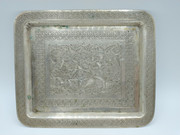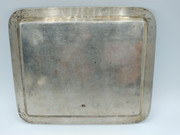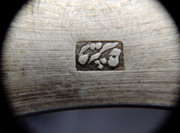Hello Ubaranda
My apologies for the delay in replying. I don’t know much about the decorative elements of Armenian silverware, so your question prompted some research.
At
https://www.fhja.ir/article_243492.html?lang=en there is a 2021 article by Professor Akram Mohammadizadeh, Assistant Professor of Islamic Fine Arts at the Tabriz Islamic Art University titled “Identifying the evolution of designs in the art of engraving on silver in Tabriz” At the link you will find the abstract which is in English as well as access to a pdf version of the article which is in Persian although the illustrations have English captions.
The English abstract is not always clear in meaning but Professor Mohammadizadeh notes, towards the end of the text, that starting in the early 20th century, after the arrival of many Armenian silversmiths in Tabriz “The roots of silver engraving motifs i
n the first 50 years after the migration of artists were influenced by common motifs in Armenian art (my emphasis added) and Iranian metalwork motifs in the first millennium BC and marginal motifs in the metalwork art of the Islamic period.”
I take from this that Armenian decorative elements were used in Iran by Armenian silversmiths.
Are there examples?
If you look at bottom of page 9 of the pdf there are two examples of design patterns shown – Kandak (engraved or trench) and Zanjil (chain). These seem to be the same two design elements shown on your cigarette case and the Kandak design is featured in the two bands on the tray which was posted at the beginning of this thread. While I can’t translate the Persian text, I imagine that these two designs are illustrated because they are Armenian designs from Tabriz silverware.
Even now there is a contemporary Armenian-Iranian silversmith, Saro Mkrtchian, who employs these design elements in his work. He has a presence on social media and tags his posts in Persian, Armenian and English.
If you google - Persian Tabriz Vige Silver Box – you ought to find on a well-known commercial site, a box which has the Kandak design as its border and has a back stamp of Vige in both Persian and Roman script. The same stamp in Persian appears on the tray which is featured at the beginning of this thread.
In every case I have come across the backstamp Vige (or Vigeh) whether in Persian or Roman script has been attributed to Iran and often to Tabriz. I have not come across a case where Vige appears as a Turkish word or name or is attributed to Ottoman Turkey.
Vige is a Persian word meaning “special” or “premium”. That is not particularly helpful since we would normally expect the backstamp to be the name of a city or of a silversmith. It turns out that Vigeh is also a Persian family name although it appears to be uncommon. In addition, the Persian could also be transliterated into Roman script as Vijeh. There was an Iranian-Swedish silversmith named Mohammad Reza Vijeh carrying on business in Sweden as recently as 2021. I don’t know if he has any connection to the VIGE whose stamp appears on the Tabriz ware.
Could Vige/Vigeh/Vijeh be an Armenian name? I don’t know.
I think that the tray which was originally posted was made in Iran based on the backstamp and it has Armenian design elements. I don’t know if the silversmith was Armenian or not.
Of course, I stand to be corrected on these points and am always happy to learn.
Perhaps someday, a reader of Persian can have a look at the article and offer a more informed answer to your question.
Finally, thank you for pointing out some time ago that the Osep Tokat book on Armenian Master Silversmiths is available online.
I hope you find these comments useful.
Regards
Damon



